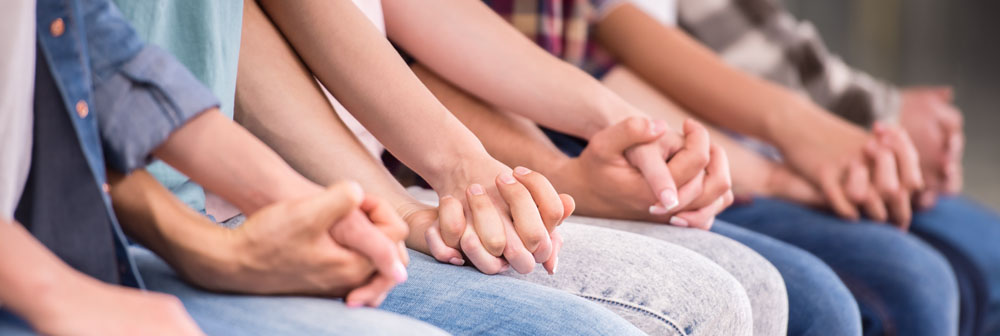Group Therapy Addiction Treatment
If you are in recovery for an addiction, behavioural disorder, or mental health problem, you are likely to have different therapy techniques used as part of your rehabilitation programme. However, you will probably have group therapy sessions in addition to one-to-one counselling. If you are going to undergo this kind of treatment, it is vital that you have a clear understanding of what it involves before actually beginning your rehabilitation.

What Is Group Therapy?
Individual counselling is commonly used as part of a recovery programme for a variety of behavioural, emotional, and psychological issues. Nevertheless, the use of group therapy is becoming increasingly more common today. Sharing experiences and stories with others can be immensely therapeutic, and it is for this reason group therapy has become a major part of most rehabilitation programmes.
This type of therapy is different to individual counselling in that it takes place with a group of people and one or more therapists. You may be uncomfortable with the idea of group therapy initially, particularly if you have been used to bottling things up and burying your true feelings, but there are many benefits to this kind of therapy.
Addressing common issues pertaining to your illness in a group setting can give you a greater understanding of how and why you feel the way you do. You will have the benefit of a support network of like-minded individuals who know what you are going through as they are experiencing a similar situation themselves.
Group therapy often includes people at various stages of treatment, which means that there will be some who are further along in their recovery than others. This offers an element of hope and inspiration to the group as it allows some members to see how far they have come and others to see what is possible with hard work and commitment.
Being part of a group can also help you to see that you are not alone. You will be with others who you can relate to and who will want to see you do well and overcome your problems.
Call our admissions line 24 hours a day to get help.
How Does Group Therapy Work?
Many people who suffer from conditions such as addiction, behavioural disorders, and mental health issues, struggle with loneliness and a sense that no one understands them.
Low self-esteem and inadequacy are often emotions that individuals in therapy experience but being a part of a group can help to minimise these feelings. During group therapy, members of the group are encouraged to support and motivate each other, and this has proven to be effective in helping people to overcome a range of emotional and psychological problems.
It can be hard for some individuals to talk about the issues that are bothering them, and within a group setting, they may be reluctant to talk and open up initially. However, as they get used to the group and its members, most will find their voice and become more willing to share their own stories. Once they realise that they are in a non-judgemental, supportive environment where everyone is in a comparable situation, they find that they become more open and are no longer afraid of being judged.
Group therapy sessions are safe and supportive, and members know that they are going to get honest feedback from other members. The sessions provide you with the opportunity to see yourself as others do and will highlight your negative behaviours. These sessions will also provide you with the chance to improve the ways in which you relate to others as well as to yourself.
Group therapy sessions can also be the perfect platform to practice newly developed skills and behaviours before taking them outside of the group. Such as session can help to strengthen relationship skills, improve confidence, and reduce your feelings of anxiety in social situations.
Call our admissions line 24 hours a day to get help.
Understanding Group Therapy
Group therapy sessions normally include one or more therapists with a group of between five and fifteen patients. Sessions usually take place once a week for around one to two hours. Nonetheless, this will depend on the therapist and the type of problem that members of the group are dealing with.

For the most part, group therapy sessions are designed to tackle a specific issue. For example, if you are trying to overcome an addiction to alcohol or drugs, you will meet in a group setting with other alcoholics or drug addicts. Some group therapy sessions could be designed to help you deal with similar symptoms resulting from different conditions. So, it could be that members are dealing with a variety of different anxiety disorders but are attending a group therapy session to help them address the feelings of social anxiety they are experiencing.
Most people find the idea of group therapy to be a bit intimidating at first. Meeting up with a group of strangers to talk about private and personal issues may seem daunting, but you will probably go on to find the experience rewarding and beneficial.
Being a part of a group means having a place to go where you can say the things you want to say, without fear of recrimination. Group therapy sessions are supportive environments that enable you to put your own problems into perspective.
You may feel a profound sense of relief to realise that you are not the only person dealing with certain issues, and hearing what others have to say can really help you to realise that you really are not alone.
What Abuse/Addictions Is Group Therapy Used to Treat?
- Prescription Drug Addiction
- Gambling Addiction
- Drug Addiction
- Alcohol Addiction
- Food Addiction
- Gaming Addiction
- Shopping Addiction
- Internet Addiction
- Sex and Love Addiction
Call our admissions line 24 hours a day to get help.
How Does Group Therapy Help in Addiction Recovery?
Addiction is often referred to as a lonely disease. Those who struggle with it frequently find that they are unable to communicate effectively with family members who cannot understand why they continue to abuse a substance or engage in an activity that has harmful consequences.

Group therapy can help in addiction recovery by providing a supportive environment that includes companionship. Members of a group therapy session will have other like-minded people to share experiences and stories with and it is this that helps them realise they are not alone. Many members will go on to become friends after they have completed their recovery programme and having this new network of people to rely on can help with the prevention of a relapse.
As part of a group therapy session, you will also benefit from learning from the mistakes of others. When you join a group, you may find that others are much further along in their recovery process than you are. Listening to their stories and experiences will give you an idea of how you should be tackling your own recovery journey. You will get an insight into how to avoid destructive behaviours and how you can develop healthy coping strategies that you can take with you on your return to normal everyday life.
Moreover, you will have the benefit of trying out these new behaviours within your group setting before you take them into the real world. Your group is like a security blanket that can help you to overcome your addiction.
Group Therapy Techniques
Group therapy sessions utilise various techniques and activities; below are a few examples:
- Ice Breakers – Icebreaker techniques are regularly used in group settings. These are a series of activities designed to help you and other members of the group get to know each other. It is likely that you will be asked to take turns introducing yourself and explaining why you are there. A range of games may also be used to help break the tension and to get you all to relax.
- Trust Building Exercises – This technique is used to help you develop understanding, empathy, and respect for others. If you have been struggling with your own personal relationships, this exercise is really useful.
- Cognitive Behavioural Groups – Cognitive behavioural groups focus on the development of new coping skills as well as relapse prevention and conflict resolution. Members will be encouraged to think about their own problems so that they can identify the negative thoughts and beliefs that may have led to their illness. Members help each other to challenge negative thoughts and behaviours and to develop new healthier alternatives.
- Psychoeducational Groups – In this type of setting, you will focus on things like anger management, unresolved trauma, family roles, and health and wellness.
- Dialectical Behaviour Therapy – With dialectical behaviour therapy, you and the other members of the group will be taught a few skills to manage your distress and control your emotions. Role play is often used to help you overcome specific issues.
- Stay-Busy Activities – With this type of therapy, you will learn different ways to help you cope with the symptoms of your illness. In terms of those in recovery for addiction, stay-busy activities can be used to help with relapse prevention.
- Creative Colouring – Creative colouring is a group activity with each member having a different colour of pencil, crayon, or marker. Each person is only allowed to use the colour they have been given and, as a group, they must create a specific picture and colour it in. This is a task that encourages teamwork. Afterwards, there will be a group discussion about the activity.
How Does Group Therapy Differ from Other Psychotherapies?
While many of the therapies used on a one-to-one basis can also be used in a group setting, group therapy differs from other psychotherapies in that it helps to improve communication and encourages teamwork. It is a fantastic way to improve self-awareness and awareness of others and it helps to instil a sense of understanding of the feelings of others.
Individual counselling allows patients to focus on their own specific issues whereas, with group therapy, common issues that the whole group can relate to are discussed. Therefore, group therapy involves simultaneous interaction with an entire group rather than a one-to-one therapy session between counsellor and patient.
You will find that many of the issues discussed in a group setting include common themes and triggers to the problem at hand, rather than individual causes of negative behaviours. Although group therapy sessions are less personal than individual counselling sessions, they do provide the opportunity to learn how to relate better towards others.
For most people, group therapy will be used in conjunction with other psychotherapies conducted on an individual basis. This ensures a more comprehensive approach to recovery.
Co-Occurring Mental Disorders Group Therapy Treats Include:
- Eating Disorders
- Obsessive Compulsive Disorder
- Unresolved Trauma
- Generalised Anxiety Disorder
- Social Anxiety
- Panic Disorder
- Post-Traumatic Stress Disorder
- Schizophrenia
- Psychosis
- Attention Deficit Hyperactivity Disorder
- Major Depressive Disorder
Other Supplemental Therapies
- Mindfulness
- Hypnotherapy
- Psychotherapy
- Art Therapy
- Music Therapy
- Yoga
- Fitness Therapy
- Holistic Therapy
- Family Therapy
- Experiential Therapy
Call our admissions line 24 hours a day to get help.

